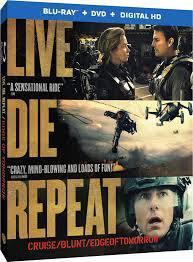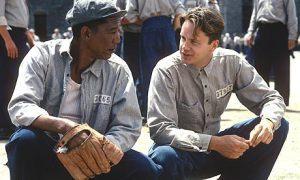I’m just going to answer the question posed in my title right away. When a movie does well it does so either in spite of a bad title or with the marketing assistance of a good title whereas when a movie does poorly its title is a likely scapegoat in the, “Where did we go wrong?” aftermath. So, movie titles matter, but the truth is no one really knows how much they matter.
The reason I even ask the question though is because of the following experience I had yesterday. I was using the Redbox app on my phone, and when I was browsing through the list of upcoming releases I was immediately struck by the following image:

Now, on my phone I couldn’t actually make out the pictures of Tom Cruise and Emily Blunt. Instead, what I immediately noticed was the gigantic text reading “Live. Die. Repeat.” I immediately experienced that rush of joy you sometimes feel when you happen upon an intriguing new movie, especially one whose title and poster so clearly communicate plot and tone. Then I glanced up at Redbox’s listing for the movie, and noticed the film’s full title, Live. Die. Repeat: Edge of Tomorrow. It’s not a new movie; it’s just Edge of Tomorrow with a new title.
As Edge of Tomorrow, it was one of the best-reviewed big movies of the summer as well as one of the season’s biggest box office disappointments. Trounced in its opening weekend by Fault in Our Stars ($28m for Edge vs. $48m for Fault), Tomorrow went on to just barely double its production budget ($178m) in worldwide gross ($364.2m). As a point of comparison, Fault had already quadrupled its $12m production budget in its first 3 days, and that’s only looking at the domestic box office. So, yeah, as a movie Tomorrow was a home run, but as a money-making endeavor it was a big whiff.
Warner Bros. pretty quickly isolated that title as a culprit, releasing new posters and online ads which emphasized the tagline (“Live. Die. Repeat”) while the film was still in theaters. Now, they are extending that approach to home video, which is risky because while it clearly means to court new audiences it may simply confuse those who already know the movie as Edge of Tomorrow. Or, as happened with me, people will be confused by it for no more than a couple of seconds, and it won’t really matter. You can’t blame Warner Bros. for trying, though, as they have been more honest than most studios would in this situation about how they are simultaneous proud of the film they made and ashamed of their failure to market it properly.
What went wrong? Were the trailers muddled and confusing, coming off as being too derivative to Groundhog Dog? Did it look too similar to Elysium and Oblivion from last year? Were audiences simply sick of Tom Cruise since he’s released at least one new movie a year since 2010, only one of which (Mission Impossible: Ghost Protocol) actually hit big ($694m worldwide)? Given Cruise’s not-as-great-as-you-probably-think box office history was Warner Bros. simply sunk the minute they let the budget (and related box office expectations) for the movie get so darn high? Did they miss a huge opportunity with female audiences by not emphasizing Emily Bunt’s kick-ass role in the film as much as they could/should have? Or was it simply because of that stupid title? Would its original title, All You Need is Kill, have been better?
The answer to every single one of those questions is probably yes, except for the one about All You Need is Kill as I am not in the camp who regards it as a better title. From a marketing perspective, it sounds too obscure, confusing, and oddly violent. However, there are so many other contributing factors to a film’s box office that generally speaking titles alone simply do not sink movies (although you could make a good counter-argument with Oogieloves in the Big Balloon Adventure). That being said, it does take a lot for a good movie to overcome a particularly bad title, one of the most famous example being The Shawshank Redemption.

Shawshank is now considered a modern classic, so beloved that it accounted for 151 hours of basic cable air time in 2013. It’s the type of movie cable stations like TNT play all the time simply because no matter how many times you’ve already seen it you’ll watch it again. As a result, it’s now one of the highest valued films in Warner Bros. film library, which is worth $1.5 billion altogether. However, during its late-1994 theatrical release Shawshank was actually a box office bomb, grossing just $28.3m against a $25m production, overshadowed by those films it ran concurrent to like Pulp Fiction, Stargate, and Interview with a Vampire. Over the years, when the film’s director (Frank Darabont) or stars (Morgan Freeman, Tim Robbins) have been asked why they think it fared so poorly in theaters they instantly point to the title, which is one of those titles that makes sense once you see the movie but doesn’t really mean much to you before that point. Interestingly, the movie’s original title was “Rita Hayworth and the Shawshank Redemption,” as per the Stephen King novella, but during pre-production agents for Hollywood actresses inundated them with calls since everyone thought the title meant they were making a Rita Hayworth biopic. Wouldn’t audiences have similarly assumed as much?

Rita Hayworth is in the movie…kind of
However, if that awful Shawshank Redemption title sunk them why didn’t it do the same for Forrest Gump? It’s hard to actually remember this, but back before Forrest Gump came out everyone around Hollywood was mocking it as having a real clunker of a title. Peter Travers even began his RollingStone review of Shawshank Redemption with, “If you think that’s a turnoff title, remember all the smartass things people said before Forrest Gump happened.” That “happened” he referred to was the $329m Forrest Gump grossed domestically, which along with The Lion King ($422m) made 1994 the first year in film history to have 2 movies gross over $300m.
That’s the kind of thing that led legendary film producer and Hollywood icon Samuel Goldwyn to once explain that “what makes a good movie title is a hit.” So, Edge of Tomorrow is not just a bad title because it sounds like it’s an old soap opera, or that it also happens to be in the first line of the theme song for Saved By The Bell: The College Years…
It’s a bad title because the movie wasn’t a hit. Or did it fail to hit because of that bad title? Oh, I’m so confused.
No one can really quantify a movie title’s impact on box office, but Hollywood is constantly worrying about it. For example, the Stallone-Schwarzenegger flick Escape Plan went through two titles before settling on one it liked, Free Birds was originally called “Turkeys,” Neighbors originally thought “Townies” was a better title, Don Jon was shortened from “Don Jon’s Addiction,” and the Robert De Niro-Michelle Pfeiffer’s comedy The Family was once “Malavita” (“The Bad Life” in Italian) then “We’re the Blakes” and then “Badfellas.” Part of this constant tug-of-war is to winnow things down to the best, most easily marketed title whereas sometimes its due to legal reasons, e.g., calling a movie “Badfellas” as a play on Goodfellas isn’t ultimately worth the legal headache. In fact, the MPAA receives between 3,000 and 4,000 titles per year, which results in between 16,000 and 20,000 objections per year, with the parties battling over titles usually settling via negotiations or, failing that, legal arbitration.
Maybe someone would have done Warner Bros. a favor if they had objected to Edge of Tomorrow and somehow forced them into a different title. Maybe a version of the movie simply marketed as Live.Die.Repeat. would have added millions to the box office, although that title could also simply make people think it sounded too much like Gerard Butler’s quasi-video game movie Gamer. However, while obviously an extreme example The Shawshank Redemption is a testament to how a truly good movie can ultimately overcome a bad title, although probably doing so long after the executives involved with the making of the movie were fired or left the studio.
What do you think? Is Live.Die.Repeat an infinitely better title than Edge of Tomorrow? Or are you one of those “All You Need is Kill would have been better!” people? And how much do movie titles really matter to you? Let me know in the comments.

